Editor:
Brandon Sweet
University Communications
bulletin@uwaterloo.ca
Faculty of Environment bids fond farewell to Dean Jean Andrey
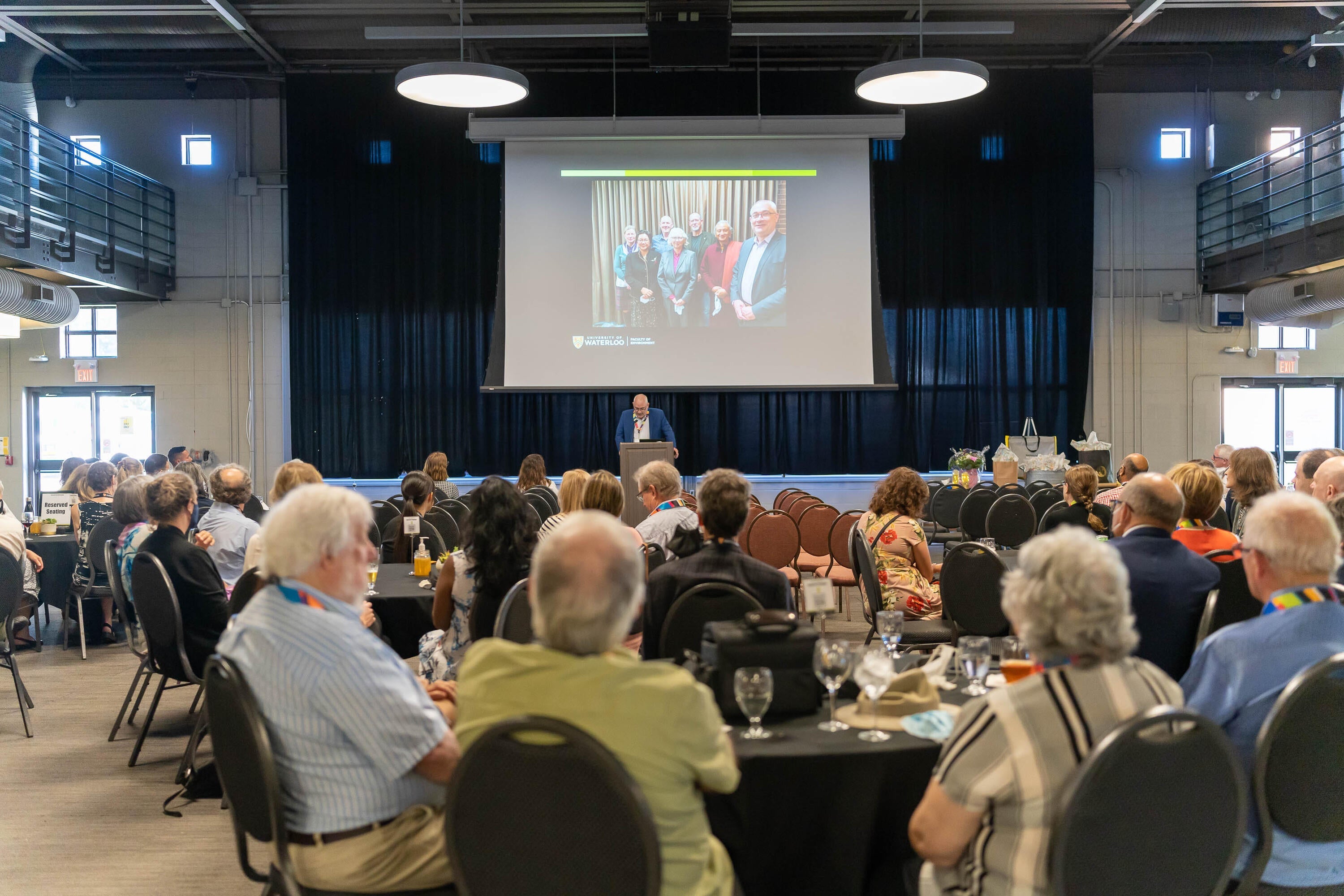
This article was originally featured on Waterloo News.
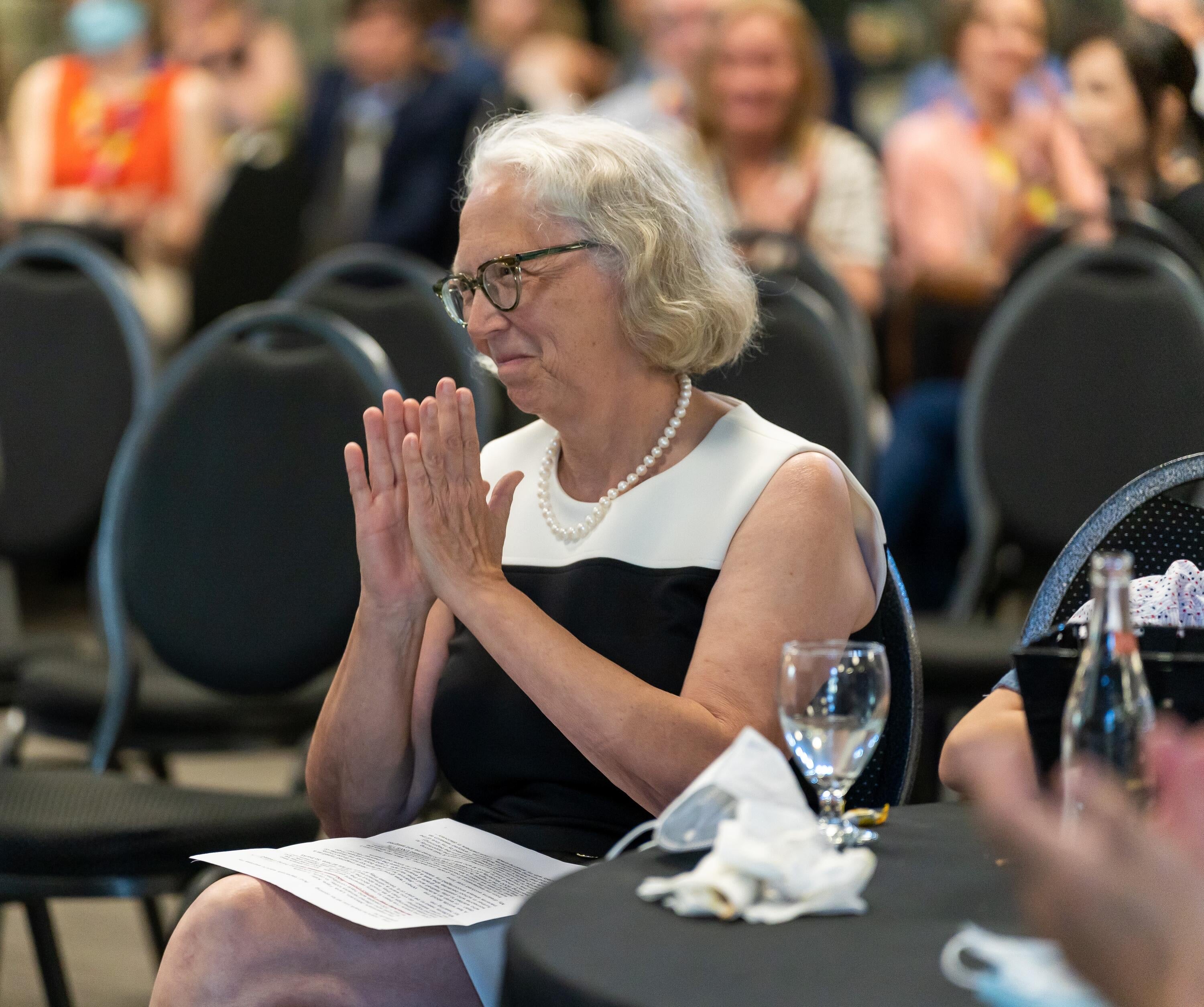 On July 1, 2022, the Faculty of Environment said farewell to Jean Andrey, fondly called Dean Jean, our esteemed dean of eight years. The whole community wishes her the best in her retirement as we reflect on all her accomplishments and contributions to the Faculty.
On July 1, 2022, the Faculty of Environment said farewell to Jean Andrey, fondly called Dean Jean, our esteemed dean of eight years. The whole community wishes her the best in her retirement as we reflect on all her accomplishments and contributions to the Faculty.
Dean Jean, as she is affectionately known, began contributing to the Faculty of Environment in 1983 while pursuing a PhD in geography. Growing up she never imagined herself as an academic. But, despite these (very) early doubts, her impact on academia was bigger than she could have imagined.
Dean Jean’s research interests include determining the implications of climate change for transportation infrastructure and operations, as well as hazards and risk assessment. Her research has been a significant contribution to the field with over 4,000 citations. She received the President’s Award for Outstanding Service/Leadership to the Canadian Association of Geographers in 2016.
More than just a researcher, she was also well-known around campus as Professor Andrey, a highly regarded teacher and mentor. In 1995 Dean Jean was awarded the Distinguished Teacher Award, and she gained the respect of her students thanks to the mix of learning methods used in her courses, as well as her energy, enthusiasm, and humour.
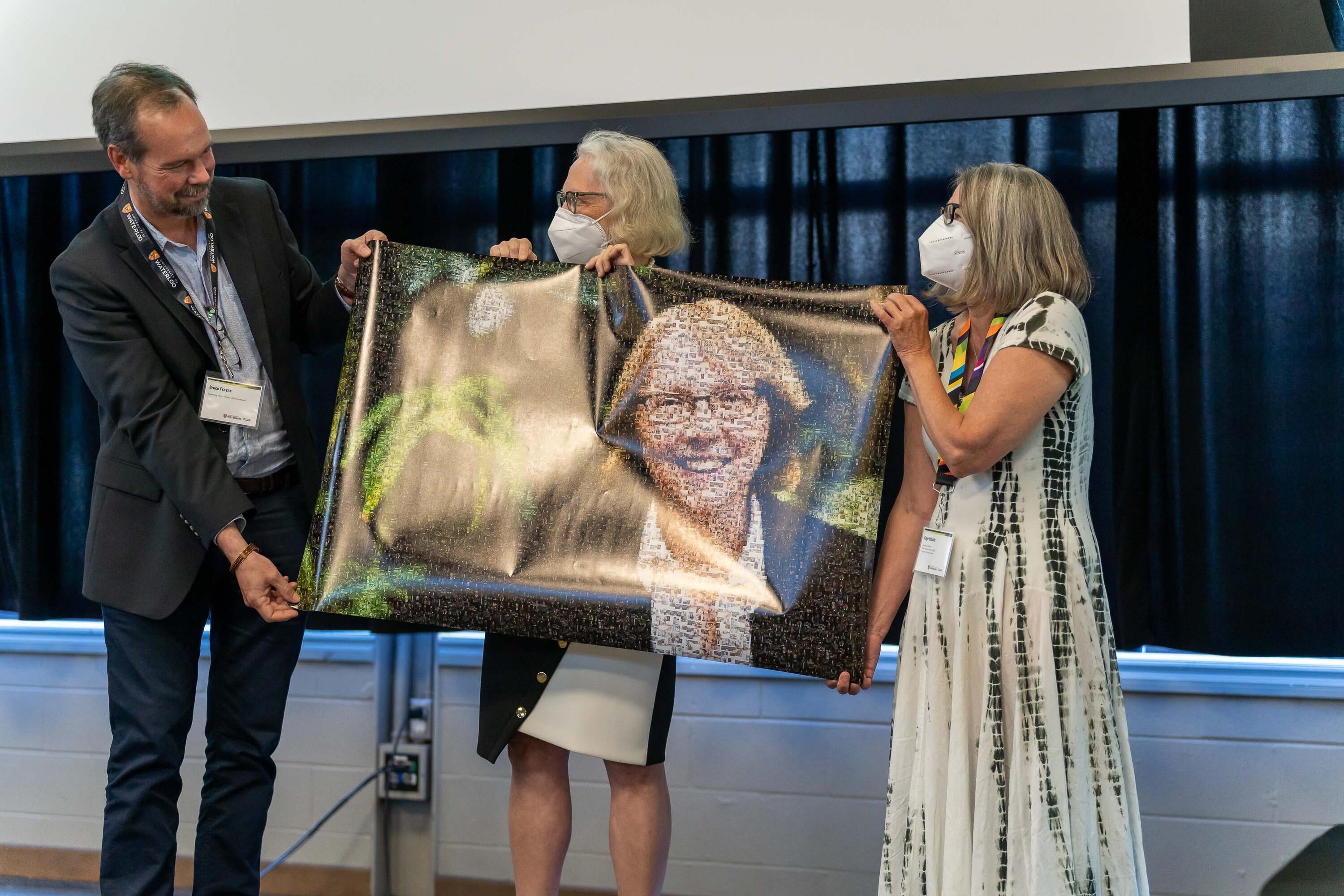 “The greatest impact her teaching has had on me is that I will look a little deeper in whatever I am doing to get a more conclusive answer/solution," says alumnus Brian D., (BES. ’95) “She is a role model that all of us will strive to be like in our future work.”
“The greatest impact her teaching has had on me is that I will look a little deeper in whatever I am doing to get a more conclusive answer/solution," says alumnus Brian D., (BES. ’95) “She is a role model that all of us will strive to be like in our future work.”
Not only is Dean Jean an academic mentor but she is an inspiration to women and girls everywhere. As a daughter to a mother who had to stop school at age 12 just because she is a female, Dean Jean never let this put a stop to her dreams. In 2012, she won the Women of Waterloo Region Award. In a nomination letter, Marilyne Jollineau, professor of Geography at Brock University called her the most outstanding and most influential teacher she ever had.
Under Dean Jean's leadership, the Faculty of Environment emerged as a national hub for climate action, sustainability solutions, flood adaptation and powerhouse of environmental research. The Faculty witnessed a doubling of Canada Research Chairs, a 40 per cent increase in research funding, and 25 per cent increase in graduate student enrolment.
“I know that this is the last time that publicly I get to tell you what a thrill and honour it has been to be a UW professor for 33 and a dean for eight years,” says Dean Jean. “And not just any Dean – but the Dean of the Faculty of Environment! As you know, I have engaged with both my head and heart, and I am so proud of the Faculty.”
From mom to academic to professor to dean (and Tigger) there no limit on of titles, accomplishments, or lives she inspired in her 33 years as a professor here at The University of Waterloo.
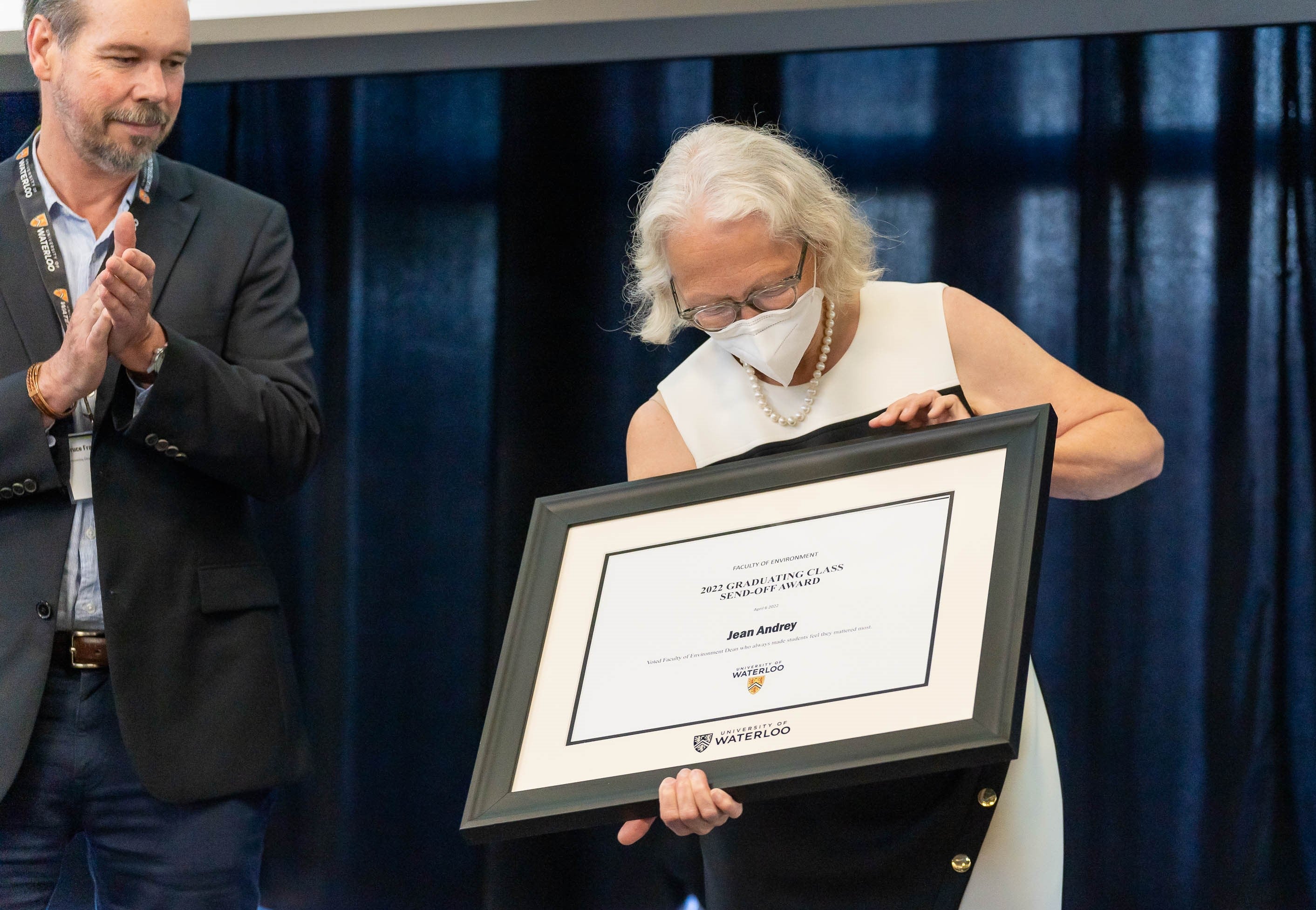 As a final goodbye, and to solidify Dean Jean as a part of the Faculty of Environment forever, a scholarship has been made in her honour — the Jean Andrey Environment Leadership Scholarship.
As a final goodbye, and to solidify Dean Jean as a part of the Faculty of Environment forever, a scholarship has been made in her honour — the Jean Andrey Environment Leadership Scholarship.
It’s been said the sign of a leader is that people feel more hopeful after working with this individual than they were before. Dean Jean is leaving the Faculty of Environment with an abundance of hope for the future. We congratulate and wish her good luck in the next chapters of her life.
You can watch the special tribute to Professor Jean Andrey.
Getting new students Waterloo Ready
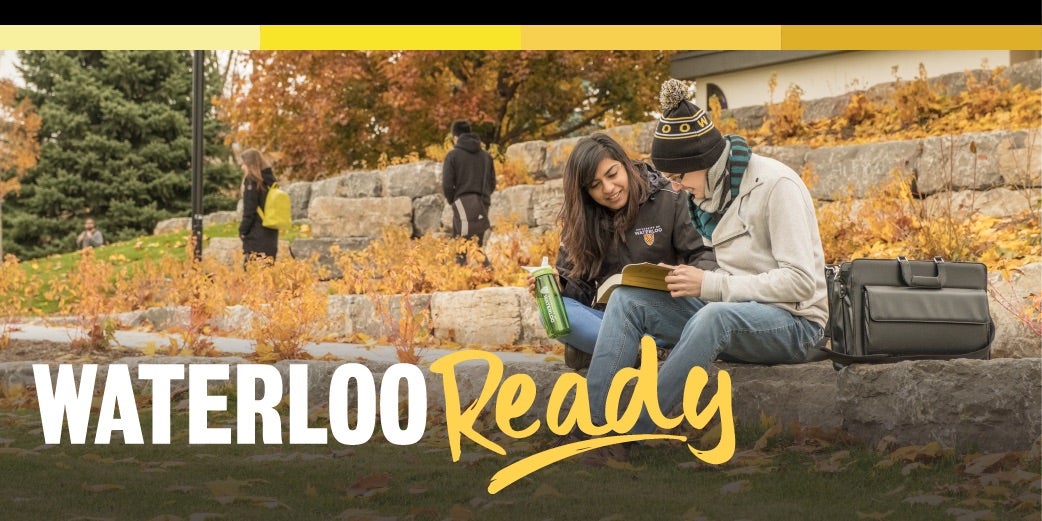
A message from the Student Success Office.
You can expect to see some new and friendly faces on campus this week, as the Student Success Office and all six faculties prepare to welcome thousands of incoming undergraduate students and their supporters to campus during Faculty Ready Days:
-
Health Ready: Wednesday, July 6, 2022
-
Arts Ready: Thursday, July 6, 2022
-
Engineering Ready: Saturday, July 9, 2022
-
Environment Ready: Tuesday, July 12, 2022
-
Science Ready: Wednesday, July 13, 2022
-
Math Ready: Thursday, July 14, 2022
These hybrid events provide undergraduate students with a head start at preparing for September and the year ahead, meeting key faculty and staff members, and establishing relationships with peers.
Faculty Ready Days are just one element of the Student Success Office’s (SSO) new student transition (NST) strategy. Through NST programming, we aspire to build students’ sense of belonging; establish students’ relationships with peers, faculty, and staff; and ultimately create environments that support success.
NST strategies have been developed to address the unique needs of both undergraduate and graduate populations. This year’s programming considers the impacts the pandemic has had on students’ learning, supports equity-deserving populations, provides important resources for international students, and fosters a vibrant and engaged student community. To achieve these outcomes, programming spans webinars, live streamed events, LEARN module content, and/or in-person opportunities.
If you're interested in joining us in welcoming our newest Warriors and their supporters to campus, consider wearing a Here to Help sticker during these events. More volunteer opportunities to welcome new students will be shared in early August.
New role enhances Indigenous presence in Science
A message from the Faculty of Science.
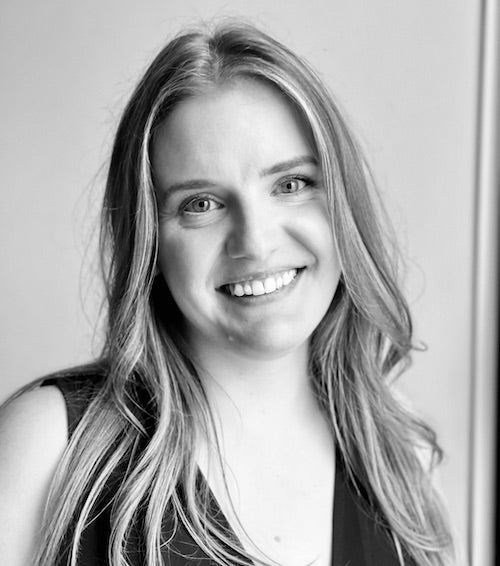
Today, Savannah Sloat steps into the role of Manager, Indigenous Science Initiatives. The new position will identify systemic and systematic changes that move beyond Truth and the Reconciliation Calls to Action and develop a Faculty of Science-specific response and long-term vision for Science.
Sloat is an Indigenous woman with mixed ancestry. Her father is Lenape and Haudenosaunee, born and raised on the Six Nations of the Grand River reserve, and her mother is descendent from Scottish settlers in the Waterloo region.
"I am excited to be joining the Faculty of Science in this new role that supports Indigenous education and community development," says Sloat. "I am passionate about experiential learning and supporting the recruitment and retention of Indigenous students. I look forward to making a positive impact in the Indigenous student experience at UWaterloo."
Sloat brings her lived, professional and academic experiences along with a passion for supporting Indigenous peoples and practices.
She is a student affairs educator with nearly ten years of experience in training, development, strategic planning, curriculum design, student retention project management and program administration. Before joining Science, Sloat worked in the Office of Research as the Project Manager, Indigenous Initiatives.
In her new role as Manager, Indigenous Science Initiatives, Sloat will be a support and advisor to senior Science Leadership and act as the Science liaison with Indigenous communities. She'll advise researchers on Indigenous Ways of Knowing and on Indigenous research themes, methodologies and practices.
Key initiatives of the role include: the development of an action plan for the Indigenization of the Science curriculum; creating a more inclusive environment for Indigenous students and faculty; and enhancing the recruitment of Indigenous undergraduate and graduate students as well as faculty.
Additionally, Sloat will develop a communications strategy and online resources to grow awareness of Indigenous initiatives and issues as well as create an Indigenous presence in the Faculty of Science, including a dedicated space for Indigenous Science students.
“I am thrilled to welcome Savannah Sloat as our new Manager, Indigenous Science Initiatives," said Bob Lemieux, Dean of Science. "Savannah will play a critical role in integrating Indigenous cultural awareness in the Science curriculum and student experience, and in creating a welcoming and supportive environment for Science Indigenous students.”
This position was recommended by the Faculty of Science Indigenous Working Group in response to the Truth and Reconciliation Commission of Canada findings and calls to actions.
Welcome Savannah!
Low-income Canadians are nearly four times more likely to die from opioids than the rich
This article was originally featured on Waterloo News.

A new study reveals a connection between poverty and opioid-related hospitalization, emergency department visits and deaths in Canada. From 2000 to 2017, Canada's poorest residents were 3.8 times more likely to die of opioid-related causes than Canada's richest residents.
The study by University of Waterloo researchers is the first to examine the connection between socioeconomic status and opioid incidents at the national level in Canada and to explore the trend over nearly two decades. Researchers used three comprehensive national databases and census data to determine the correlation between areas' income levels and opioid-related health issues.
"Opioid-related harms are at a crisis level in Canada," said Wasem Alsabbagh, a pharmacy professor at Waterloo and lead author of the study. "Opioid-related hospitalizations in Canada have increased by more than 50 per cent from 2007 to 2017. In Ontario, emergency department visits more than doubled. We explored the trends between socioeconomic status and opioid harms so that we can better understand how to address the opioid crisis."
The researchers processed information from Statistics Canada and examined the postal codes associated with all reported opioid-related deaths, hospitalizations and visits to emergency departments. They found that the lower the income of an area, the greater the number and rate of opioid-related harms.
From 2000 to 2012, Canadians in lower-income areas were 4.3 times more likely to be hospitalized and 4.9 times more likely to end up in the emergency department than those in higher-income areas. For opioid deaths, the gap between low-income and high-income Canadians dying of opioid use narrowed, but a substantial gap remains. By 2017, Canadians living in the lowest income areas were still almost 2.5 times more likely to die of opioid-related causes.
"For many, socioeconomic status is a result of past experiences – families, neighbourhoods, education and other earlier life events, in addition to current access to material and social resources that help individuals cope with challenges," Alsabbagh said. "Often, we see low socioeconomic status in concentrated geographic areas where there is poorer access to resources. In addition, psychosocial factors, such as feeling marginalized or enduring discrimination and social isolation, can have an effect. By drawing the link between low socioeconomic status and opioid harm, we can design policies that more appropriately serve the needs of our communities."
The study was recently published in the journal Health Promotion and Chronic Disease Prevention in Canada.
Wednesday's notes
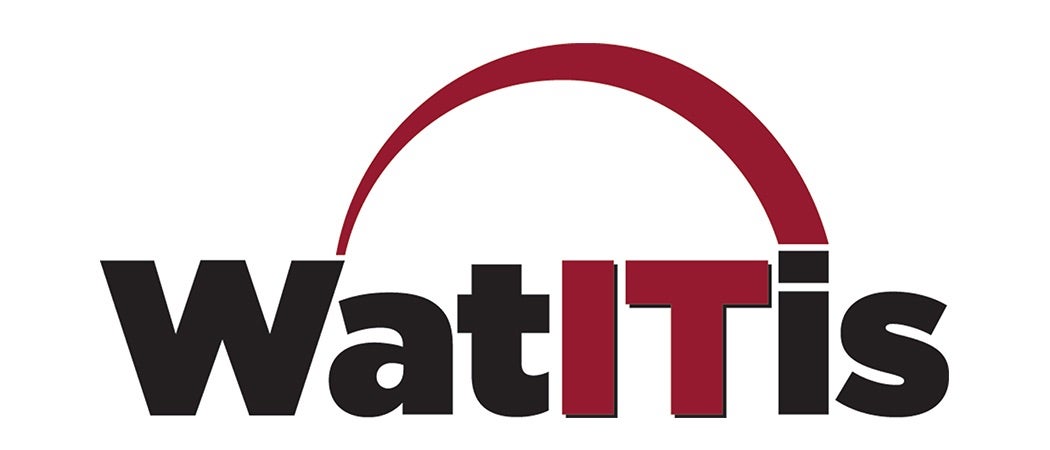
The proposal deadline for the WatITis conference has been extended until Thursday, July 7.
The annual WatITis conference will be held on Wednesday, December 7, 2022. "This is a wonderful opportunity to learn more about University of Waterloo systems and technology," says a note from conference organizers. "This year our keynote speakers will follow the theme of ‘IT Sustainability’ and as such, we welcome general systems and technology speaker proposals in addition to speaker proposals related to the topic of sustainability. We encourage and invite all staff members at UWaterloo to actively participate as a speaker, panel participant, or poster presenter."
If you are interested in presenting at WatITis, please submit a brief synopsis of your presentation idea to the WatITis call for papers site. If you have any questions, please contact Pavol Chvala or Dana Mohapl.
Employers hosting Virtual Employer Information Sessions (VEIS) next week includeNulogy Corporation. Make sure to register through WaterlooWorks and check the calendar for any updates.
Link of the day
When and Where to get support
Students can visit the Student Success Office online for supports including academic development, international student resources, immigration consulting, leadership development, exchange and study abroad, and opportunities to get involved.
Instructors looking for targeted support for developing online components for blended learning courses, transitioning remote to fully online courses, revising current online courses, and more please visit Agile Development | Centre for Extended Learning | University of Waterloo (uwaterloo.ca).
Instructors can visit the Keep Learning website to get support on adapting their teaching and learning plans for an online environment.
Course templates are available within your course in LEARN to help you build and edit your content and assignment pages quickly.
The following workshops, webinars, and events are offered by the KL team (CTE, CEL, ITMS, LIB):
-
Scholarship of Teaching and Learning (SoTL) Methods – self-directed, continuous self-enrollment course in LEARN.
-
Independent Blended Course Design (iBlend) - self-directed, continuous self-enrollment course in LEARN.
-
Copyright Overview for Waterloo Instructors and Staff - self-directed, continuous self-enrollment course in LEARN.
-
Independent Remote Course Design Essentials (iReCoDE) - self-directed, continuous self-enrollment course in LEARN.
-
Supporting Student Mental Health (for Instructors) – self-directed, continuous self-enrollment course in LEARN.
-
WAI Inspired Wednesdays: Enabling the uptake of feedback (CTE7010) – July 13, 10:00 a.m. to 12:00 noon
-
SoTL Stories – July 13, 1:00 p.m. to 2:00 p.m.
-
WAI Inspired Wednesdays: Redesigning Assignments from a Remote Offering to a Flipped Course (CTE7010) – July 20, 10:00 a.m. to 12:00 noon.
Supports are available for employees returning to campus. Visit IST’s Hybrid Work and Technology guidelines and workplace protocols to assist with the transition.
The Writing and Communication Centre has in-person and virtual services to support grad and undergrad students, postdocs and faculty with any writing or communication project. Services include one-to-one appointments, drop-ins at Dana Porter Library, online workshops, writing groups, English conversation practice, and custom in-class workshops.
Co-op students can get help finding a job and find supports to successfully work remotely, develop new skills, access wellness and career information, and contact a co-op or career advisor.
The Centre for Career Action (CCA) has services and programs to support undergrads, grad students, postdocs, alumni, and employees in figuring out what they value, what they’re good at, and how to access meaningful work, co-op, volunteer, or graduate/professional school opportunities. Questions about CCA's services? Live chat, call 519-888-4047, or stop by our front desk in the Tatham Centre 8:30 a.m. to 4:30 p.m., Monday to Friday.
Drop-in to Warrior Virtual Study Halls on Wednesdays from 5:30 p.m. to 7:00 p.m. Come together in this virtual space to set goals and work independently or in groups each week.
Renison's English Language Institute continues to offer virtual events and workshops to help students practice their English language skills.
If you feel overwhelmed or anxious and need to talk to somebody, please contact the University’s Campus Wellness services, either Health Services or Counselling Services. You can also contact the University's Centre for Mental Health Research and Treatment. Good2Talk is a post-secondary student helpline available to all students.
The Library is open with expanded hours for access to book stacks, drop-in individual study space, bookable group study rooms, drop-in access to computers and printers, book pick-up services and IST Help Desk support. Librarian consultations, Special Collections & Archives and the Geospatial Centre are available by appointment. Full details on current services and hours are available on the Library’s COVID-19 Update webpage.
The Faculty Association of the University of Waterloo (FAUW) continues to advocate for its members. Check out the FAUW blog for more information.
The University of Waterloo Staff Association (UWSA) continues to advocate for its members. Check out the UWSA blog for more information.
The Sexual Violence Prevention and Response Office (SVPRO) supports all members of the University of Waterloo campus community who have experienced, or been impacted, by sexual violence. This includes all students, staff, faculty and visitors on the main campus, the satellite campuses, and at the affiliated and federated Waterloo Institutes and Colleges. For support, email: svpro@uwaterloo.ca or visit the SVPRO website.
The Office of Indigenous Relations is a central hub that provides guidance, support, and resources to all Indigenous and non-Indigenous campus community members and oversees the University's Indigenization strategy.
The Waterloo Indigenous Student Centre, based at St. Paul’s University College, provides support and resources for Indigenous students, and educational outreach programs for the broader community, including lectures, and events.
WUSA supports for students:
Peer support - MATES, Glow Centre, RAISE, Women’s Centre - Visit https://wusa.ca/services/wusa-peer-support to book an appointment either in person or online for the Fall term.
Food Support Service food hampers are currently available from the Turnkey Desk 24/7 in the Student Life Centre. Drop off locations are also open again in SLC, DC, DP, SCH and all residences.
Co-op Connection all available online. Check https://wusa.ca for more details.
Centre for Academic Policy Support - CAPS is here to assist Waterloo undergraduates throughout their experience in navigating academic policy in the instances of filing petitions, grievances and appeals. Please contact them at caps@wusa.ca. More information is available.
WUSA Student Legal Protection Program - Seeking legal counsel can be intimidating, especially if it’s your first time facing a legal issue. The legal assistance helpline provides quick access to legal advice in any area of law, including criminal. Just call 1-833-202-4571.
Empower Me is a confidential mental health and wellness service that connects students with qualified counsellors 24/7. They can be reached at 1-833-628-5589.
GSA-UW supports for graduate students:
The Graduate Student Association (GSA-UW) supports students’ academic and social experience and promotes their well-being.
Advising and Support - The GSA advises graduate students experiencing challenges and can help with navigating university policies & filing a grievance, appeal, or petition.
Mental Health covered by the Health Plan - The GSA Health Plan now has an 80 per cent coverage rate (up to $800/year) for Mental Health Practitioners. Your plan includes coverage for psychologists, registered social workers, psychotherapists, and clinical counselors.
Dental Care - The GSA Dental Plan covers 60 to 70 per cent of your dental costs and by visiting dental professionals who are members of the Studentcare Networks, you can receive an additional 20 to 30 per cent coverage.
Student Legal Protection Program - Your GSA fees give you access to unlimited legal advice, accessible via a toll-free helpline: +1-833-202-4571. This advice covers topics including housing disputes, employment disputes, and disputes with an academic institution.
The Graduate House: Open Monday to Tuesday 11:30 a.m. to 7:00 p.m. and Wednesday to Friday 11:30 a.m. to 9:00 p.m. We’re open to all students, faculty, staff, and community members. The Graduate House is a community space run by the GSA-UW. We’re adding new items to the menu. Graduate students who paid their fees can get discounts and free coffee.
When and Where (but mostly when)
Warriors vs. Laurier Blood Donation Battle. Join our “Waterloo Warriors” team on the Blood.ca website or app. #ItsInYouToGive
Warriors Custom Apparel Program, June 22 – July 13. Purchase customized team specific gear to get ready for the 2022-2023 season. Hoodies, Hats, Jerseys, T-shirts and more. Buy now.
Warriors Youth Summer Day Camps, July 4 to September 2. Open to boys and girls age 5-18. Baseball, Basketball, Football, Hockey, Multi-Sport and Games & Volleyball. Register today.
Valuation of water quality in Canada: An overview of the upcoming policy needs and challenges, presented by Jean-Michel Larivière, Environment and Climate Change Canada. Part of the Water Institute's webinar series: The Value of Water in Canada, Wednesday, July 6, 12:00 p.m.
Métis 101, Wednesday, July 6, 1:00 p.m. to 3:00 p.m.
WaterTalk - Nature Water: A journal for all water-related research, presented by Fabio Pulizzi. Thursday, July 7, 10:00 a.m.
WISE Workshop, “Introduction to Feedback-Based Optimization and Applications to Energy Systems” by Daniel Eduardo Olivares Quero, Monday, July 11, 9:00 a.m. to 4:00 p.m., In-person at Evolv1 Classroom.
NEW - Visiting Professor Catherine Le Visage presents “Forgoing animal experiments: a case study in intervertebral disc regenerative medicine”, Thursday July 14, 3:30 p.m. to 4:30 p.m., E6-2024. Light refreshments provided. Please register here.
Positions available
On this week's list from the human resources department, viewable on the UWaterloo Talent Acquisition System (iCIMS):
- Job ID# 2022-8818 - Payroll Administrator - Human Resources, USG 6 – 7
- Job ID# 2022-8688 - Adaptive Educational Technologist - AccessAbility Services, USG 8
- Job ID# 2022-8710 - Graduate Coordinator - Computer Science, USG 5 – 6
- Job ID# 2022-8715 - Residence Life Co-Ordinator - Campus Housing, USG 7
- Job ID# 2022-8519 - Administrative and Financial Coordinator - CEE - Centre for Career Action, USG 6
- Job ID# 2022-8711 - Online Learning Group Manager (Agile Development Team) - Centre for Extended Learning, USG 10
- Job ID# 2022-8728 - HRM Program Coordinator and Academic Advisor – Psychology, USG 6
- Job ID# 2022-8772 - Writing and Communication Advisor - Graduate Student and Postdoctoral Fellow Support - Writing and Communication Centre, USG 8 – 10
- Job ID# 2022-8775 - Administrative Coordinator and Advisor, Undergraduate Studies - Communication Arts, USG 6
- Job ID# 2022-8764 - Coordinator, Master of Engineering Program and Communications - Civil and Environmental Engineering, USG 6
- Job ID# 2022-8791 - Research Information Technologies Specialist - Office of the Vice-President, Research and International, USG 10
- Job ID# 2022-8795 - Animal Health Technician - Office of Research Ethics, USG 6
- Job ID# 2022-8687 - Dean's Office Assistant - Faculty of Health - Dean's office, USG 5
Secondments/Internal temporary appointments
- Job ID# 2022-8713 - Communications Officer - Institute for Quantum Computing, USG 10
- Job ID# 2022-8723 - International Communications Specialist - Waterloo International, USG 8